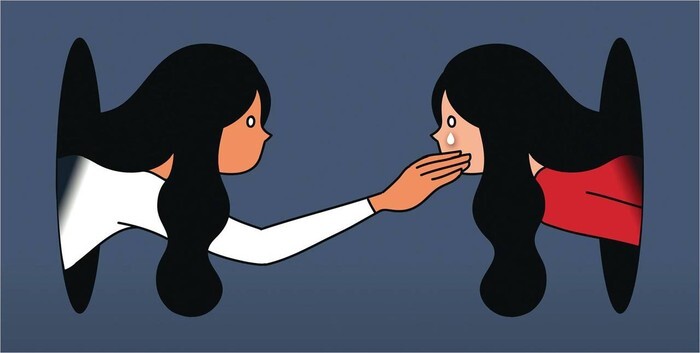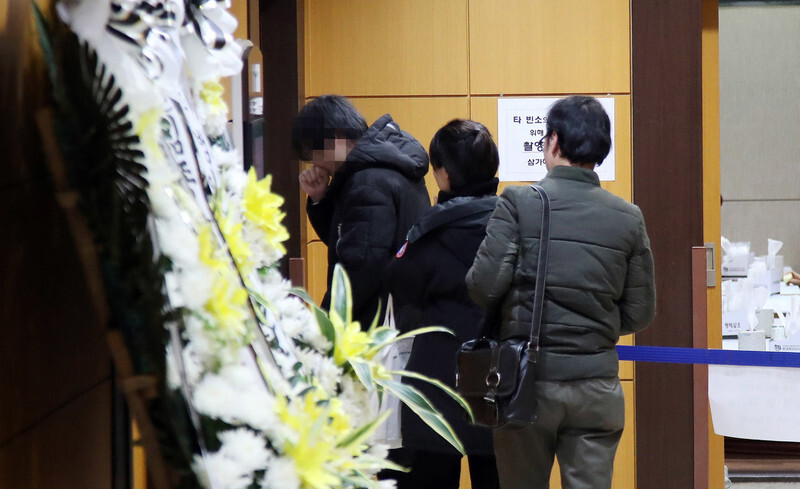hankyoreh
Links to other country sites 다른 나라 사이트 링크
Cyberbullying and serial celebrity suicides

Calls for measures to deal with malicious internet posts are growing louder following the suicide of entertainer and K-pop star Goo Hara, which comes on the heels of singer Sulli also taking her own life. With both performers having complained regularly of emotional suffering due to malicious internet comments, the general consensus is that the posts contributed substantially to their decision to commit suicide.
“How can you expect people to cope with masses of people insulting you and saying they hate you every day?” said one prominent male actor in a telephone interview with the Hankyoreh.
“Even a single malicious post leaves you preoccupied,” the actor added, suggesting the seriousness of cyberbullying.
Nearly 40 S. Korean celebrities commit suicide since 2000Since 2000, around 40 South Korean entertainers have made the tragic decision to take their own life. In the past, the reasons tended to be varied but were mostly based on the general difficulties of life. Since the development of online culture, however, the wounding effects of online messages have become one of the chief factors. Actor Choi Jin-sil and singers U;Nee and Sulli all ended their lives ostensibly because of malicious posts.
As malicious online messages have emerged as a social issue, portal sites -- considered hotbeds for the posts -- have begun undertaking their own clean-up efforts. In the wake of Sulli’s death, Daum Kakao eliminated the comments section for its entertainment articles. Conversely, Naver’s only response was to intensify its filters by using “cleanbots” to automatically hide posts containing unpleasant language, maintaining its comments section in spite of criticism.
As more and more entertainers are starting to communicate with fans through social media rather than portal sites, the focus of malicious posts has migrated over to social media. Indeed, one malicious comment was posted on one of Goo’s social media accounts five hours before her death.
“Entertainment agencies can take it upon themselves to request that [performers] not look at portal comments, but they can’t tell them not to look at posts on their own social media accounts,” said a staffer at one entertainment agency.
“They also communicate with fans in real-time videos, and there isn’t anything you can do about posts that come up under those circumstances.”
“It’s even more serious when it comes to social media posts,” the staffer added. Fortunately, social media platforms are attempting to implement their own changes, with Twitter announcing on Nov. 25 that it would be expanding a “hide reply” feature worldwide after previous pilot applications in Canada, the US, and Japan. Previously, deleting malicious posts required the entire message to be taken down; with the “hide reply” feature, users can hide malicious posts on their own.

But many observers say the situation calls for stiffer punishments and other legal and institutional measures rather than pinning hopes on sites “cleaning up their act.”
“It seems like the posts haven’t gone away because even when people are caught writing malicious posts, they usually get only a slap-on-the-wrist punishment such as a fine,” said the president of one entertainment agency. Indeed, an internet user in their 30s who posted malicious comments about rhythmic gymnast Son Yeon-jae received only a fine of 300,000 won (US$255.22).
Another entertainment agency manager said, “Even when people are caught, we tend to lose our resolve if they apologize, and they end up being treated leniently out of concern for the artist’s image.”
In a telephone interview, Son Sung-min, chairman of the Korea Entertainment Management Association, told the Hankyoreh that it is “important to create a law prohibiting malicious online messages, including a list of banned words, and to step up punishments to reinforce the perception that this is a crime.”
“We need politicians to take an interest so the relevant laws and institutions can be reinforced,” he said.
A so-called “Choi Jin-sil act” for the adoption of an online real name system was previously pursued in the wake of Choi’s suicide in October 2008, but ended up not passing amid arguments from internet companies and politicians that it restricted freedom of expression.
“We’re talking about an internet real name system again and calling for measures to be put in place against malicious posts,” a former pop group member told the Hankyoreh in a telephone interview.
“While things have been dragging out, our friends are dying.”
By Nam Ji-eun, staff reporter
Please direct comments or questions to [english@hani.co.kr]

Editorial・opinion
![[Editorial] Intensifying US-China rivalry means Seoul must address uncertainty with Beijing sooner than later [Editorial] Intensifying US-China rivalry means Seoul must address uncertainty with Beijing sooner than later](https://flexible.img.hani.co.kr/flexible/normal/500/300/imgdb/original/2024/0517/8117159322045222.jpg) [Editorial] Intensifying US-China rivalry means Seoul must address uncertainty with Beijing sooner than later
[Editorial] Intensifying US-China rivalry means Seoul must address uncertainty with Beijing sooner than later![[Column] When ‘fairness’ means hate and violence [Column] When ‘fairness’ means hate and violence](https://flexible.img.hani.co.kr/flexible/normal/500/300/imgdb/original/2024/0516/7417158465908824.jpg) [Column] When ‘fairness’ means hate and violence
[Column] When ‘fairness’ means hate and violence- [Editorial] Yoon must stop abusing authority to shield himself from investigation
- [Column] US troop withdrawal from Korea could be the Acheson Line all over
- [Column] How to win back readers who’ve turned to YouTube for news
- [Column] Welcome to the president’s pity party
- [Editorial] Korea must respond firmly to Japan’s attempt to usurp Line
- [Editorial] Transfers of prosecutors investigating Korea’s first lady send chilling message
- [Column] Will Seoul’s ties with Moscow really recover on their own?
- [Column] Samsung’s ‘lost decade’ and Lee Jae-yong’s mismatched chopsticks
Most viewed articles
- 1[Editorial] Transfers of prosecutors investigating Korea’s first lady send chilling message
- 2For new generation of Chinese artists, discontent is disobedience
- 3[Photo] 1,200 prospective teachers call death of teacher “social manslaughter”
- 4[Exclusive] Unearthed memo suggests Gwangju Uprising missing may have been cremated
- 5S. Korea “monitoring developments” after report of secret Chinese police station in Seoul
- 6[Column] US troop withdrawal from Korea could be the Acheson Line all over
- 7Xi, Putin ‘oppose acts of military intimidation’ against N. Korea by US in joint statement
- 8[Column] Samsung’s ‘lost decade’ and Lee Jae-yong’s mismatched chopsticks
- 9[Column] When ‘fairness’ means hate and violence
- 10[Editorial] Intensifying US-China rivalry means Seoul must address uncertainty with Beijing sooner t